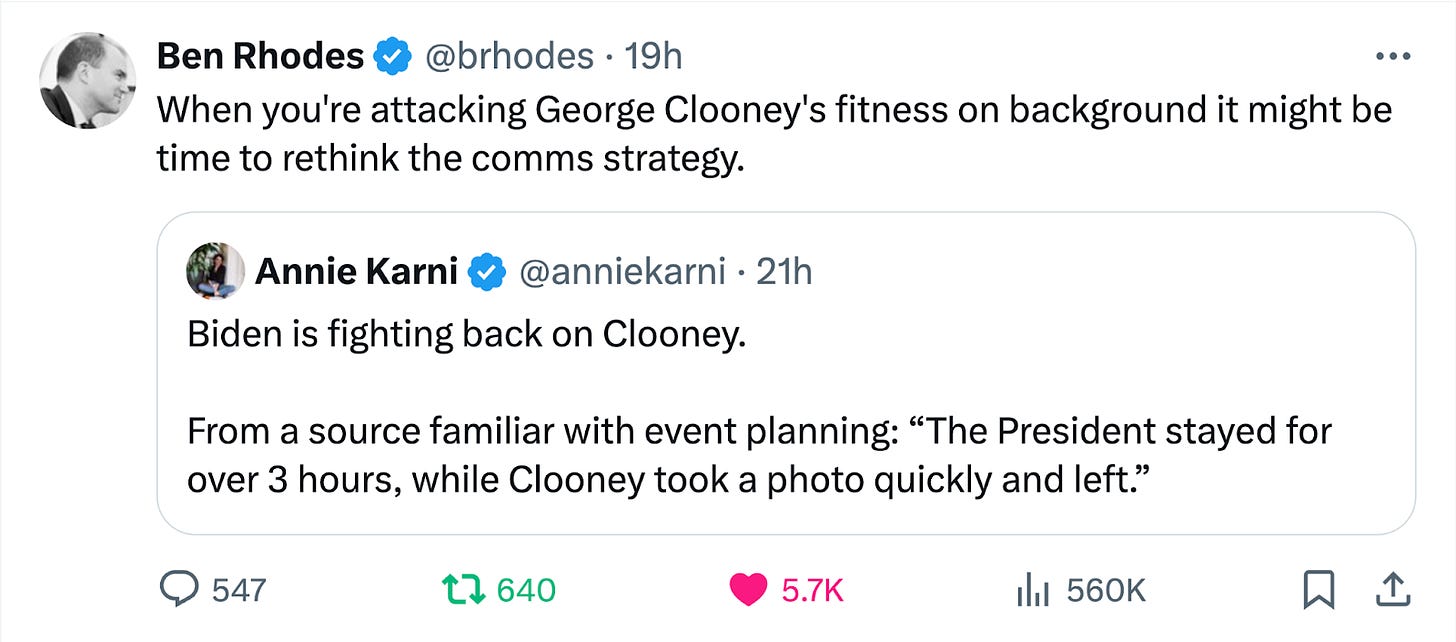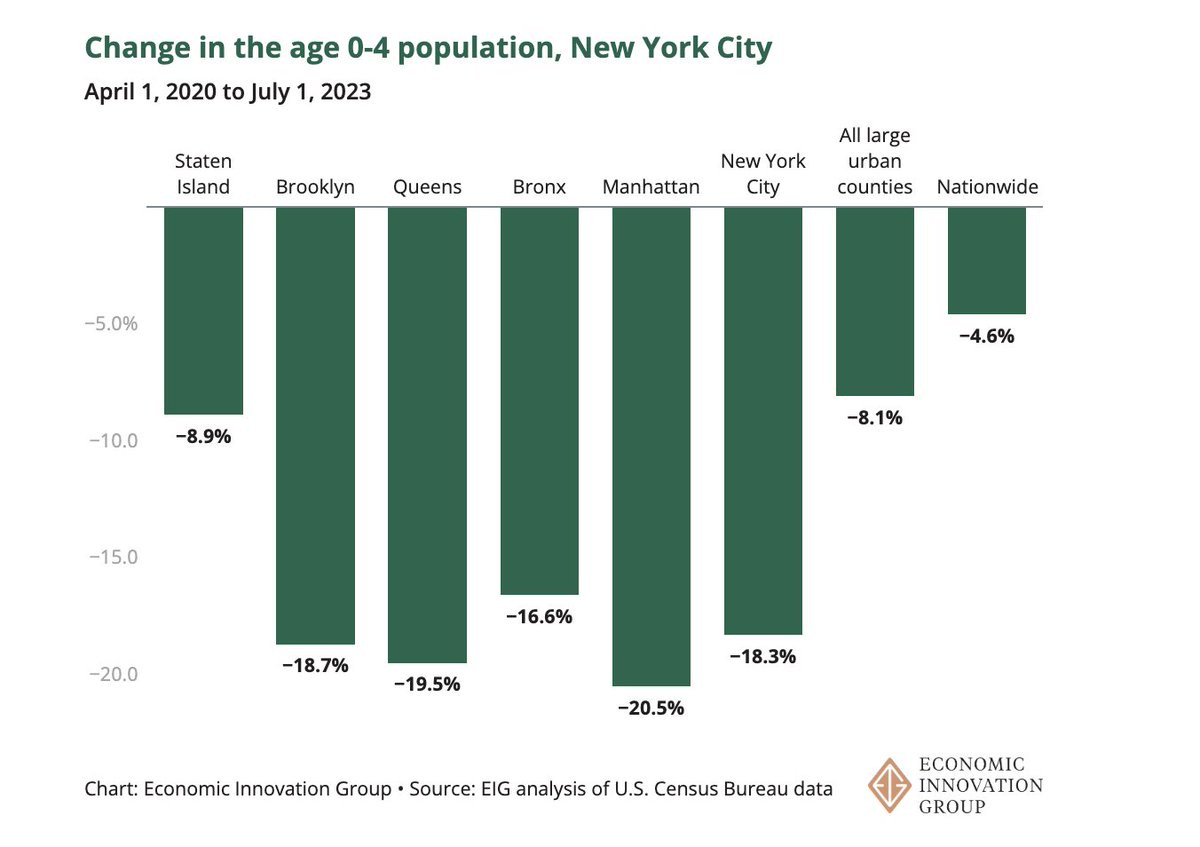July 11: A Cease-Fire Deal Emerges
Has Obama had it with Biden?; The Bouteflika Presidency; New York, you're bringing me down
The Big Story
Senior U.S. officials are touting a cease-fire “framework” they claim has been accepted by Israel and Hamas, with the parties now “negotiating details of how it will be implemented,” according to a Wednesday report by David Ignatius of The Washington Post.
According to the report, the framework provides for three phases. Per Ignatius:
First would be a six-week cease-fire, during which Hamas would release 33 Israeli hostages, including all female prisoners, all men over 50 and all who are wounded. Israel would release hundreds of Palestinians from its prisons and withdraw its troops from densely populated areas toward the eastern border of Gaza. Humanitarian aid would flow in, hospitals would be repaired, and crews would begin clearing the rubble.
Ignatius reports that the “breakthrough” came when Hamas agreed to drop its demand for written guarantees for an end to the war. Instead, it has accepted language from a U.S.-backed U.N. Security Council resolution in June that stated, “If the negotiations take longer than six weeks for phase one, the ceasefire will still continue as long as negotiations continue.”
While that certainly seems to us like a formula for more endless negotiations—why would Hamas relinquish its only leverage by releasing the remaining hostages?—the deal does, on paper, provide for a second phase. Here’s Ignatius again, emphasis ours:
Israel and Hamas have both signaled their acceptance of an “interim governance” plan that would begin with Phase 2, in which neither Hamas nor Israel would rule Gaza. Security would be provided by a force trained by the United States and backed by moderate Arab allies, drawn from a core group of about 2,500 supporters of the Palestinian Authority in Gaza who have already been vetted by Israel. Hamas has told mediators that it is “prepared to relinquish authority to the interim governance arrangement,” a U.S. official said.
So, as we’ve been saying for several months now: a U.S.-backed PA security force, on the model of the U.S.-backed Lebanese Armed Forces, operating as de facto human shields for the local Iranian terror militia. And, in what is no doubt an incredible coincidence, the plan simply reinvents the Biden administration’s pre-Oct. 7 plan for a 5,000-strong, U.S.-trained-and-equipped, Fatah-controlled Palestinian “counterterror” force in the West Bank, which Tony Badran savaged in Tablet all the way back in March 2023. We’ll quote Tony at length—just mentally substitute Gaza for the West Bank:
Of course, not only does the LAF not go after Hezbollah ever, to the contrary, it facilitates, provides support, coordinates, and deploys jointly with Hezbollah, while also interfacing on its behalf with international interlocutors. And if you thought this was in conflict with American and European expectations for the force, you have it exactly backward. No one defends this behavior more than American policymakers, who ridicule the suggestion that the LAF should perhaps behave differently. Do you want civil war in Lebanon? is the prepackaged retort.
This will most likely be the U.S. posture after the creation of the new Palestinian force, whenever the latter opts not to take action against other factions—as has repeatedly already been the case in the West Bank, where Hamas enjoys a sizable share of public support. We can therefore expect to hear plenty more on how “acting as Israel’s police force” erodes the credibility of the force, or how it could trigger a Palestinian civil war in the West Bank, which “wouldn’t be in Israel’s interest,” and so on.
The point is, the administration’s plan, and the U.S. investments it is designed to create and sustain, are meant to be disincentives for Israeli operations in the West Bank. This is the model the U.S. has been implementing in Lebanon, turning that Hezbollah-run territory into an effective American protectorate run by a terror army that directly benefits from increased U.S. and European investments. In the Palestinian case, the potential deployment of U.S. and other foreign servicemen would serve as an added deterrent to Israel acting in its own defense, and putting American investments at risk.
Phase three, if we ever get there, envisions a “multiyear reconstruction plan” for Gaza—e.g., zillions in Western and Arab cash for Hamas to confiscate for the liberation struggle. Of course, the Israelis also read The New York Times, so they may figure they have only a few months left of dealing with Jake Sullivan et al., so why not throw them a bone?
Ignatius’ story also alludes to the work of the “dashing” Amos Hochstein in Lebanon. Emphasis is, again, ours:
Lebanon has signaled that following a Gaza truce, it would endorse a package that includes withdrawal of Hezbollah forces north from the border to near the Litani River. The agreement would also include Israeli acceptance of border changes that Hezbollah has long demanded and other confidence-building measures to end the deadly exchange of rocket fire between the two sides.
Why would the U.S. force Israel to accept border changes demanded by Hezbollah in exchange for Israel folding to U.S. pressure not to attack Hezbollah? Because the Obama-Biden doctrine is to position Washington as a neutral interlocutor between Israel and the Iran-backed terror empire—i.e., to act as Iran’s lawyer and errand boy.
IN THE BACK PAGES: Moses? Jesus? Mohammed? How about Zeus and Demeter? Maggie Phillips profiles the neo-pagans who worship the Greek gods
The Rest
→Were we too quick to dismiss the possibility of an anti-Biden coup? Yesterday, actor and Democratic megadonor George Clooney—who has vacationed in Italy with Barack and Michelle Obama, and who Michelle has joked would be her “freebie” (look it up)—penned an op-ed in The New York Times calling on Biden to withdraw as the Democratic nominee. Of the June fundraiser with Biden and Barack Obama, which produced videos of a doddering Biden that the White House dismissed as “cheap fakes,” Clooney wrote:
It’s devastating to say it, but the Joe Biden I was with three weeks ago at the fund-raiser was not the Joe “big F-ing deal” Biden of 2010. He wasn’t even the Joe Biden of 2020. He was the same man we all witnessed at the debate.
Clooney’s op-ed prompted MSNBC’s Joe Scarborough, a close friend of Biden and the host of his favorite TV show, to declare on the Thursday edition of Morning Joe: “What’s going on behind the scenes is the Biden campaign and many Democratic officials do believe that Barack Obama is quietly working behind the scenes to orchestrate this.” Politico confirmed Thursday that Obama had been “in touch with” Clooney prior to the publication of the op-ed and didn’t “object” to its contents.
The ObamaBros were less circumspect than their former boss:
Even Biden’s campaign staff are letting slip to the media that they think he should go. “Several of Biden’s closest allies, including three people who are directly involved in efforts to re-elect him, told NBC News they now see his chances of winning as zero,” NBC reported Thursday. Said one “person working to re-elect him” (a lawyerly phrase, for what it’s worth): “No one involved in the effort thinks he has a path.”
In the same article quoted above, Politico reported that “speaker emerita” Nancy Pelosi—who appeared on MSNBC Wednesday to advise Biden to decide quickly whether or not to step down, despite repeated assurances from the Biden camp that he’s already decided—was quietly instructing Democrats in swing districts to “do whatever they have to” to secure reelection, even if that means calling for Biden’s resignation. Her only condition? Wait until after this week’s NATO Summit.
→In our June 28 Big Story, Tony Badran referred to the Biden administration as “the Bouteflika Presidency”—aka a “shadow presidency” with a “ceremonial figure in the Oval Office who’s clearly incapacitated.” (The name comes from former Algerian President Abdelaziz Bouteflika, who spent much of his final term “ruling” while in a coma.) Think we were exaggerating? Behold, from CNN, the Bouteflika Presidency:
Pollster Nate Silver, who drew our attention to the above passage on X, also highlighted a Thursday report from the Milwaukee Journal-Sentinel, which revealed that after Biden gave an interview to a Milwaukee radio station last week, his team successfully lobbied the station to edit out two gaffes, including the president saying “I have more Blacks in my administration than any other president.”
→But the Bidens could still decide to go to the mattresses. A Wednesday report in The Daily Beast quoted a “well-connected Democratic lawyer/lobbyist” who said that Hunter Biden had now become “the acting chief of staff” and the “one who’s bucking up his dad” amid the chorus of calls for him to step down. Former House Speaker Kevin McCarthy revealed to Fox earlier this week, meanwhile, that Jill Biden—who loves being First Lady so much she had the Marine Corps band compose original entrance music, “Fanfare for the First Lady”—had sat in on “many” Oval Office meetings. So if Joe’s not all there and Jill likes living in the White House and Hunter knows that dad’s reelection is his best chance to avoid federal prison … how exactly does anyone get Joe to step down? Biden will hold a news conference at 5:30 this afternoon, so we may learn more then.
→The Department of Defense finally found some domestic terrorists it’s worried about: pro-lifers! On Wednesday, X user @samosaur shared this slide from an anti-terrorism training at Fort Liberty (known as Fort Bragg until last year):
According to @samosaur’s source, the slide immediately followed a slide about ISIS and included the license plate “IM4IT”—used by pro-lifers to encourage adoption—as an indication of potential membership in a terrorist group. Fort Liberty’s public affairs officer confirmed the authenticity of the slide to a reporter from The Federalist but said the presentation had not been “vetted by the appropriate approval authorities,” did not reflect the views of the Army or the Department of Defense, and “will no longer be used.”
→Is New York a “battleground state”? That was the assessment of Manhattan Borough President Mark Levine in a Wednesday Politico article that cited polls showing that Biden’s lead in New York, which the president won by 23 points in 2020, had narrowed to 8 points. Is a -15 point swing in the Empire State realistic? We’ll see. But a new poll from the New York Solidarity Network found that 35% of registered New York Jewish voters—of which there are 1.5 million in total—agreed that “New York is no longer a safe haven for Jewish life and the Jewish people,” while a recent Daily Show focus group of Black New York voters found them evenly split, 3-3, between Biden and Trump. So, maybe anything is possible:
→Speaking of New York, here’s our Chart of the Day:
That’s an illustration of the Children of Men-style baby bust in New York City since the onset of the pandemic—the nation’s worst, larger than the 14% decline in Los Angeles County and the 15% decline in Chicago’s Cook County. The main exceptions to urban demographic collapse, per Connor O’Brien of the Economic Innovation Group, come from the counties surrounding booming Sunbelt cities such as Austin and Dallas, Texas; Tampa, Florida; and Atlanta, Georgia. Within New York, it’s the Satmar Hasidic stronghold of South Williamsburg, the youngest neighborhood in the five boroughs, with a median age of 19.5, per Census data provided by the New York Department of City Planning.
→And finally, for the person in your life who won’t stop saying that Bibi (or Israel) “propped up Hamas,” here’s Times of Israel columnist Haviv Rettig Gur:
The whole conversation—which touches on U.S. foreign policy incompetence, the moral arrogance of American progressivism, and the emerging alliance structure in the Middle East—is worth a listen.
TODAY IN TABLET:
Jab, Jab, Hook, Hook, by Dan Klores
A New Yorker finds his inner Jew
SCROLL TIP LINE: Have a lead on a story or something going on in your workplace, school, congregation, or social scene that you want to tell us about? Send your tips, comments, questions, and suggestions to scroll@tabletmag.com.
A Return to Mount Olympus
For neo-pagan followers of Greek polytheism in the U.S., everything ancient is new again
By Maggie Phillips
The American educational system acquaints most of us with Zeus, Apollo, and Aphrodite at some point in our schooling. The names on the page are abstractions, and the readings seem as ancient as the Bronze Age conflict that Homer recounts in The Iliad. But as some X (formerly Twitter) users may be aware, there are 21st-century practitioners of Greek polytheism for whom the Greek pantheon is very real and present.
Many modern-day practitioners come to ancient Greek religion through neo-paganism, which has been on the rise for decades, with followers numbering around 1.5 million in the U.S. at present. Although it is almost impossible to collect numbers on how many practitioners are active in the United States, anecdotally this subgroup represents a small portion of that 1.5 million.
“I do not have any demographic data, but in my experience worshippers of the Greek gods are fewer than neo-pagans worshiping in other traditions, such as the Celtic, Norse, and Egyptian,” said Bruce MacLennan—a practitioner of what he calls Hellenismos (a name for Greek polytheism) for 40 years—in an email. “I have often called Hellenismos a minority tradition in a minority religion. This has always perplexed me, for Greek mythology, philosophy, art, and literature are fundamental to Western culture and generally more familiar than these other pagan religious traditions. My impression, from books, workshops and talks at meetings, and online material, is that Hellenismos has been becoming more popular in recent years. This might be due in part to popular movies and books based on Greek mythology.”
Even as universities are shutting down their humanities and classics departments nationwide, there is something of a popular revival of interest in the classical world. As of this writing, Percy Jackson and the Olympians is in its 727th week on The New York Times’ list of Children and Young Adult Series’ Best Sellers. A TV adaptation debuted last year on both Disney+ and Hulu, and it was among the top five most-watched premieres on either streaming service for 2023. The book’s story is familiar: Supernatural denizens of a hitherto hidden world equip an obscure, down-on-his-luck adolescent for a Manichean showdown with an ancient evil. But it is not witches and wizards, or an intergalactic religious order who equip Percy, our Chosen One, but the Greek pantheon. A spinoff book, Percy Jackson’s Greek Gods, presents their ancient backstories anew for young readers, with irreverent, snarky asides and jokey slang. Hesiod it is not. But it is popular: Author Rick Riordan’s website boasts 190 million copies of his books in print globally. Whether it’s a YA series, social media memes about men who think about the Roman Empire every day, anime like Blood of Zeus, the Hades video games, or even the increased popularity of Christian classical education, the Greco-Roman past is suddenly hot, even in the world of religion.
Alongside these trends, a disparate spiritual movement has emerged in recent years that incorporates ancient, pre-Christian Greek religion into contemporary spirituality. In many cases, it is a reconstruction of ancient practices from centuries before, drawn from historical sources. For other practitioners, the Greek pantheon is part of other neo-pagan or occult practices.
As with many spiritual movements, defining the contours of their beliefs is difficult, but certain commonalities exist. The practitioners of ancient Greek religion with whom I spoke were interested less in rejecting a particular religious upbringing or background than in constructing meaning through their personal beliefs and practices by looking to the past.
There are in-person Greek polytheistic groups that get together. Nearly every practitioner I spoke to meets infrequently with other like-minded polytheists in an in-person group, but prefers to practice individually. “Modern Pagan practitioners, including Hellenic polytheists, run the gamut,” said Sabina Magliocco, a professor of anthropology and religion at the University of British Columbia. “Some practice as solitaries, joining with others only occasionally at national or international conferences or local festivals, while others meet regularly in groups. It really depends on the individual.”
“It is fair to say most of it exists online and small pockets of in-person communities or organizations,” said Angelo Nasios, who writes and podcasts about Hellenism, or Greek culture, and history. He is also one of a number of Americans of various ages and walks of life who are connecting with the Greek pantheon as part of their spirituality.
Nasios said that his own practice is fairly informal. He occasionally posts pictures of his home altars on X. “Usually, I try to do once a week some sort of like prayer offering,” he said, “I keep it very simple.” For him, the Greek gods are real beings, but, he said, “I don’t do literalism.” The myths are not gospel. Rather, he explained, the gods for him are best understood as universal principles and the laws that govern nature. “They maintain the order of the universe,” he said.
Suz Thackston has been practicing ancient Greek polytheism for around 20 years. Raised in the Church of Jesus Christ of Latter-day Saints, she did a stint as an unaffiliated religious “none,” before engaging with Wicca. It was through Wicca that she first encountered Greek polytheism. She became a member of Hellenion, a U.S.-based organization dedicated to reconstructing ancient Greek polytheism through organized study groups and congregations. She is no longer a member. These days, for the most part, she prefers to observe her spirituality privately. She meets up with other Greek polytheists in person only intermittently, she said, encountering them now primarily through her participation in a local chapter of the Covenant of Unitarian Universalist Pagans. “Connection with the gods was becoming more and more important,” she said of her decision to strike out on her own. “I think the more that you do that, the less that any sort of doctrine, even something as loose as Hellenic polytheism, is going to fit.” Today, she said her spirituality is focused more on ancestral and nature spirits.
Thackston does still identify as a Demetrian priestess, however: someone with a particular devotion to the goddess Demeter. “I’m dedicated to all the gods of Greece, but in particular to Demeter and Persephone,” she said. “And so the 'Homeric Hymn to Demeter' is sort of my Bible.” (The Homeric Hymns are a collection of 34 poems dedicated to different gods, attributed commonly to Homer.)
Although Hellenion trains priests and priestesses, Thackston is not herself a trained priestess. She said she performs many of the public functions of a priestess, however: teaching classes, writing books, performing public rituals. “I keep the shrines,” she said, “I say the words when I’m supposed to. I’m doing all the work of a priestess.” She said this role was revealed to her once while performing a ritual, during which, she said, “the gods called me ‘priestess.’”
Thackston said the Greek pantheon speaks to her in various ways. She maintains a journal, which she returns to frequently to decipher any patterns in the way the gods may be acting in her life. She also consults with others who she feels may know the gods better. One example is her belief that Demeter speaks to her through songbirds. She calls the "Homeric Hymn to Demeter" her “grounding text,” but she acknowledges that she is unaware of any ancient text that describes Demeter communicating to devotees that way.
Although Thackston’s spirituality is primarily experiential in nature, she maintains a reverence for the authority of ancient texts dealing with the Greek gods. “Doing reconstruction is a really good idea for a while,” she said, “so that you do know how our spiritual ancestors did it.” For her, this knowledge is essential to developing an authentic personal practice. “I think it’s a good thing to know how the gods that we love were approached and worshiped in the past, because it gives us ideas for how to rebound that into newer and more wonderful ways for us to do it.”
Although Thackston mostly celebrates those coming to the Greek pantheon through pop culture and secondary sources right now—“I’m kind of tickled about it”—she said it can also be “exasperating.”
“They’re reading other people’s readings of [the original texts], which is, you know, a fun thing to do, because you want to hear different people’s experiences, but then taking that as gospel,” Thackston said. “And if it’s someone they like or admire, for example, they’re more likely to just glom onto their point of view, than go back to the original text and do their own research.”
A neophyte who reads a critical essay condemning what the author sees as the patriarchal nature of Homer’s "Hymn to Demeter," for example, may lack the historical literacy to realize that virtually everything we know about ancient Greek religion comes from the stories, historical records, and artifacts of an inherently patriarchal society. They may also miss the cultural context.
Nasios is concerned about what he sees as an appropriation of Greek culture and ancient religion by non-Greeks who adopt Greek gods. Himself the son of a Greek immigrant father and a descendent of Greek Cypriots on his mother’s side, he dislikes the use of the descriptors Hellenismos and Hellenism for the paganism he incorporates the Greek pantheon into spirituality. “It’s not helpful to use phrases like Hellenism and Hellenismos for actual Greeks,” he said, “when practitioners who are not of Greek descent use those words, if they’re laboring under sort of a misunderstanding of those terms themselves.”
Baptized Greek Orthodox, but raised without Christianity as “a dominant force” in his upbringing, Nasios said he came to ancient Greek religion after getting into tarot in his adolescence. This interest led to a phase of religious exploration. “I read the Bible and history,” he said, “and kind of worked my way backward.” Arriving at ancient Greece as a stop on this spiritual odyssey, he said, “it really spoke to me when I really looked at it closer.” His Greek father had raised him with a respect for the classical world, taking pains to bring his son’s attention to this part of his cultural inheritance. Today, Nasios is deeply read in Greco-Roman and Byzantine history, with an M.A. in ancient history. He regularly engages with historians and academics on his podcast and blog, both named The Hearth of Hellenism.
Read the rest here.









In 2nd phase, Hamas will relinquish authority. I laugh.
What about the rest of the hostages?
The proposed ceasefire will result in what happened in Lebanon with Israel's military options further jeopardized.